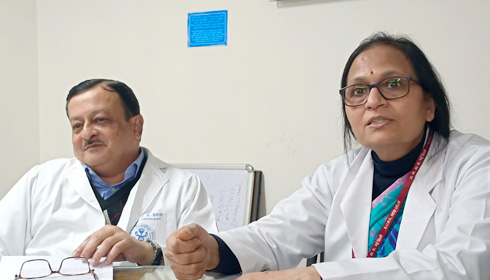
Childhood cancers are highest among all cancers in Delhi: AIIMS
Numbers of childhood cancers, including bone tumour and retinoblastoma, are the highest among all cancers in the national capital, and they are increasing alarmingly more than those of national figures, say Delhi-AIIMS doctors.
Referring to the Delhi Cancer Registry, run by Delhi-AIIMS, doctors said that four per cent of all cancers in Delhi are paediatric cancers against one to two per cent that occur nationally.
Delhi-AIIMS is undertaking a study to ascertain the exact cause of paediatric cancer in the national capital.
Addressing the media on the occasion of World Cancer Day, Prof VS Deo, Head of the Department of Surgical Oncology, Delhi-AIIMS, said that the good sign is that the cure rate of paediatric cancer is the best among cancers across all age groups.
“If detected in time, paediatric cancers have a recovery rate of around 90%,” he added.
As per the registry, Delhi reports around 22,000 cancer cases every year. Thirty per cent of cancer cases are related to tobacco consumption. Among males, head and neck cancers are the highest, followed by cancers of the lung, gastrointestinal (GI) tract cancer (food pipe, stomach and colon cancer) and urinary system (urinary bladder and prostate).
GI cancer is rising because of unhealthy eating habits and adopting the western lifestyle, intake of low fibre diet, packaged food and junk food.
Breast cancer is the most common in females, followed by cervical, lung, gall bladder, and ovarian cancer.
In India, around 13-14 lakh new cancer cases are reported in the country every year.
Prof Deo pointed out that a special department called Preventive Oncology is being run by Delhi-AIIMS to prevent the disease.
“In this department, we educate people about cancer prevention strategies such as a healthy and balanced diet which include a lot of vegetables, and fruits, avoiding sugar, fast food, junk food, packaged food and ultra-refined food, and avoiding consumption of tobacco and alcohol. Around 30%-40% of cancers can be prevented if people follow these precautions,” Prof Deo further stressed.
Prof Sushma Bhatnagar, Head, IRCH and Chief, National Cancer Institute (NCI), Jhajjar, said that cancer cases are rising because patients are reporting the disease in advanced stages due to stigma and fear, which can be addressed by spreading awareness and education.
“We ( at AIIMS) are running a large prevention and awareness programme. We want to raise awareness throughout India. We use a district as a pilot project, screening everyone in the district to detect cancer at an early stage. We begin treatment as soon as they are identified. Similarly, if a patient presents with advanced cancer and requires palliative care, we will provide it,” she added.
“The other unique thing about AIIMS is the patient-centric approach. There is better coordination between IRCH Jhajjar and NCI,” Dr Bhatnagar.
“When a patient arrives at AIIMS, five doctors from various fields examine them to ensure care planning and the appropriate treatment pathway. The treatment planner specifies which treatments, such as surgery, chemotherapy, or radiotherapy, will be administered. This is being done to save time for the patient.”
Speaking about the treatment procedure followed at Delhi-AIIMS, Prof Bhatnagar said that pain management is one of the procedures at Delhi in which the quality of life of patients improves drastically.
“Most of the patients bear the pain and there is a misconception that pain and cancer are synonyms but our AIIMS hospital is called pain free hospital. We provide pain-free treatment to all patients in IRCH and the NCI and ensure good quality of life for them,” she said.
On treatment modalities, she said, “The biggest treatment plan is the uniform protocol of treatment. We ensure minimum investigation and maximum output and information.”